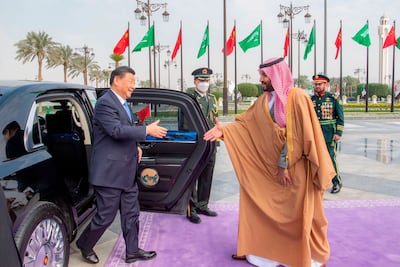Saudi Arabia is bringing policymakers, government officials, investors and executives from top companies in both the kingdom and China under one roof in Riyadh as it looks to deepen its trade ties with the world's second-largest economy.
The 10th Arab-China Business Conference, taking place on June 11 and 12 at the King Abdulaziz International Conference Centre, is seen as a significant step forwards in Saudi Arabia’s efforts to boost trade with China beyond the hydrocarbons sector and attract Chinese investments in the non-oil economic sectors of the kingdom, analysts say.
“This is a major event and the gathering makes perfect business and economic sense,” Ihsan Bu Hulaiga, an independent Saudi economist said. “Trade between Saudi Arabia and China has risen in a very consistent [manner] from the 2000s until today."
The two economies have “mutual needs” and the relationship has all the ingredients to be a “sustainable one for years to come”, he said.
This year, the conference is held under the theme "Collaborating for Prosperity" and will focus on economy, trade and investment to further help boost relations with China.
One of the key objectives will be to explore ways to strengthen existing ties, said Monica Malik, chief economist at Abu Dhabi Commercial Bank.
“China is already one of the largest trading partners for Saudi Arabia and it is a key export market for its hydrocarbons.
“From the kingdom’s perspective, it is very important.”
Saudi Arabia, which has been diversifying its economy away from oil, is looking to deepen trade and economic ties with partners around the world.
The conference is “important and critical” for future collaboration and prosperity, said Maha Akeel, a Saudi political commentator, lecturer and consultant.
“Being hosted by Saudi Arabia, a key player in the region economically and politically, gives the themes and agenda of the conference added significance and indications of future directions for investments and business opportunities,” she said.
Maha Akeel was the director at the information department of the Organization of Islamic Cooperation.
'Great milestone'
China has also played an important role in restoring relations between Iran and Saudi Arabia.
This will strengthen their relations with other Arab states, said Ahmad Hijazi, a Saudi businessman in Jeddah.
"This was a great milestone for the kingdom and shows the importance of China as our partners, not just in trade but also politically," he said.
"China has always been a great partner for our business and we have been working with them in the manufacturing sector for more than nine years."
Prince Abdulaziz bin Salman Al Saud, Minister of Energy, Laura May-Lung Cha, chairwoman of Hong Kong Exchanges and Clearing, Prince Faisal bin Farhan, Minister of Foreign Affairs, Ahmed Aboul Gheit, Secretary General League of Arab States, and Abdullah Alswaha, Minister of Communications and Information Technology, will speak at the conference.
It is expected that up to 2,500 people from China will attend.
Industry sectors such as AI, renewable energy, robotics, tourism, logistics and transportation will feature.
Trade ties between China and the Arab world go back 1,500 years, to the time of the Silk Road. Today, China is Saudi Arabia’s largest trading partner.
In 2021, trade between the two countries reached $87.3 billion. Between January and October 2022, it reached $95.46 billion.
China is Saudi Arabia's largest importer of oil from the kingdom, buying about 1.75 million barrels of oil per day in 2022.
Last year, Chinese President Xi Jinping's visit to Saudi Arabia marked a major milestone in Saudi Arabia's relationship with Beijing as well as other Arab states. President Xi Jinping attended summits with Arab leaders during his three-day visit.

Some 35 agreements worth about $30 billion were signed during his visit to the kingdom.
An alignment plan between Vision 2030 and China’s Belt and Road Initiative was agreed by Crown Prince Mohammed bin Salman and President Xi Jinping, as well as a memorandum of understanding in the field of hydrogen energy, to activate the housing memorandum and co-operation in civil and commercial cases.
The Saudi Investment Ministry signed with Shandong Innovation Group, for the construction of an aluminium plant. Other companies included in the signing of MoUs include the chemical company Kingfa, Shanghai-based wind turbines and energy software company Envision, and China’s Economics and Technology Research Institute.
"In March, Aramco unit acquired a 10 per cent stake in Rongsheng Petrochemical for $3.6 billion, which is a huge investment and opportunity for us to expand our operations in China," said Rakan Alaref, a Saudi business operations manager in Jeddah.
"We have been working with China in renewable energy and are committed to them as partners eyeing big opportunities for both of us."
Aramco's chief executive Amin Nasser said in March the kingdom wants to be an all-inclusive source of energy and chemicals for China’s long-term energy security.
"That’s why we are doubling down on China’s energy supply, including new lower carbon products, chemicals, and advanced materials, all supported by emissions reduction technologies," he said.
Saudi Arabia also joined the Shanghai Cooperation Organisation, which includes China, India and Russia.
Last week, Iran reopened its diplomatic missions in Riyadh restoring diplomatic ties with Saudi Arabia after a seven-year rift following a Chinese-brokered deal in March.
At a press conference with US Secretary of State Antony Blinken on Thursday, Saudi Foreign Minister Prince Faisal bin Farhan said China's relationship with Saudi Arabia and other regional countries will probably continue to grow.
“That partnership has given us and China significant benefits and that co-operation is likely to grow just because of China's economic impact on the region," he said.

